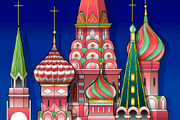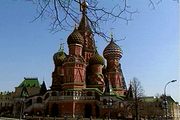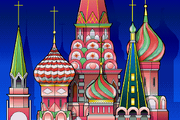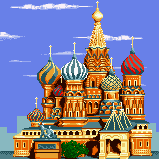St. Basil's Cathedral
From the Super Mario Wiki, the Mario encyclopedia
Jump to navigationJump to search
- “This strange and wonderful church was built in 1555 by Duke Ivan III,[sic] known as Ivan the Terrible. He ordered the church built to honor the holy fool, St. Basil. (Holy fool is the name for a saint in Russia.) The famous 'onion' domes were added later in the 16th century. Although the church appears to have no real design, the building was carefully built as one large chapel surrounded by eight, dome-topped chapels. Every room is painted in different patterns and colors.”
- —Pamphlet, Mario is Missing! (PC)
St. Basil's Cathedral (Russian: Собор Василия Блаженного, Sobor Vasiliya Blazhennogo) is a famous church in Moscow known for its onion domes. One of those Cathedral Domes has been stolen by Koopa Troopas in the PC, SNES, and NES versions of Mario is Missing!, causing the entire structure to be closed down, and Luigi has to return it to its rightful place in the cathedral. The curator rewards the player 2,250 dollars and a bonus of 3,000 dollars if he returns the dome first.
Questions[edit]
After obtaining the Dome and bringing it to the appropriate information booth, Luigi must prove that it is genuine by answering some questions, which are as follows:
- Holy Fool means _____ in Russian.
- idiot
- saint
- onion
- four
- Who ordered the church built?
- Basil the Pesto
- Ivan the Terrible
- Ivan the Domed One
- Peter the Great
- The central structure is ___ feet high.
- 107
- 37
- 199
- 234
Multimedia[edit]
| File info 0:07 |
Internal names[edit]
| Game | File | Name | Meaning
|
|---|---|---|---|
| Mario is Missing! (Macintosh) | L13A | L13A | Landmark 13 A |
Names in other languages[edit]
| Language | Name | Meaning | Notes |
|---|---|---|---|
| French | La Cathédrale St. Basile[1] | St. Basil's Cathedral | |
| German | Basilius Kathedrale[2] | St. Basil's Cathedral | |
| Slovenian | Katedrala Vasilija Blaženega[3] | St. Basil's Cathedral |
Notes[edit]
- The pamphlet information (above) incorrectly states that the cathedral was built by Ivan III. Actually, it was Ivan IV who commissioned it (and who is the one known as "Ivan the Terrible"; Ivan III would be known as "Ivan the Great").
References[edit]
- ^ Mario a disparu. Software Toolworks (French). Retrieved April 22, 2025.
- ^ Mario wir vermisst. Software Toolworks (German). Retrieved September 23, 2024.
- ^ Club Nintendo Yugosa 1993 09



